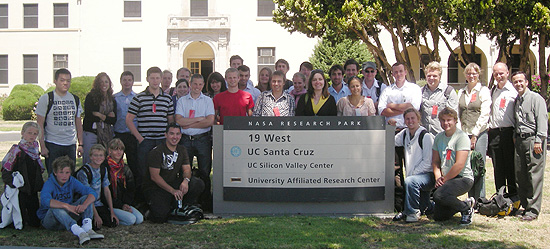The Bio-Info-Nano Research and Development Institute (BIN-RDI) of the University of California, Santa Cruz, is sponsoring four programs in renewable energy through the summer of 2009. The goal of these initiatives is to foster global collaborative study and research that yields useful alternative energy solutions.
A June 5 workshop addressed the future of local electric microgrids. As local generation and use of power becomes more prevalent, new microgrid distribution infrastructures are emerging that are optimal for local sources of renewable energy. The workshop examined how best to plan for microgrid distribution systems, including but not limited to photovoltaic sources. Participants included researchers from academic, government, nonprofit, and industry organizations in California, Denmark, and the United Kingdom. It was the first in a planned series of BIN-RDI workshops on the renewable energy microgrid.
The Photovoltaic Test-bed Facility broke ground in June at the BIN-RDI facilities at NASA Ames Research Center. Phase one involved the installation of a solar panel array and other equipment. Led by Joel Kubby, associate professor of electrical engineering at UCSC'S Jack Baskin School of Engineering, the test bed will address knowledge and experience gaps that inhibit the establishment of shared standards for the integration of different renewable energy sources in distributed grids. Wind turbines will be added to the facility in phase two. The project is supported by BIN-RDI and NASA's Aligned Research Program.
Five UCSC engineering students sponsored by BIN-RDI are doing summer research internships with Nobuhiko Kobayashi, associate professor of electrical engineering, who leads the Nanostructured Energy Conversion Technology and Research (NECTAR) laboratory. NECTAR, an affiliate of the Advanced Studies Laboratories (ASL), conducts fundamental research to develop next-generation energy sources using nanoscale materials and technologies. The student interns are working to create new materials for NECTAR projects.
UCSC faculty affiliated with BIN-RDI are also participating in the Denmark-California Renewable Energy Summer Program, a four-week intensive summer program designed to inspire and prepare students to find sustainable solutions to climate change. The program includes activities at UCSC, UC Davis, UCSC facilities at NASA Ames, and UC Merced. It features a systems approach to understanding energy technologies, project-based learning, and the managerial and entrepreneurial aspects of "green business." This is the second year of the program; the summer 2008 session took place in the Zealand and Lolland regions of Denmark. Kubby and Ali Shakouri, professor of electrical engineering, lead the faculty in this program. Participants include students from UC Santa Cruz, UC Davis, UC Merced, Copenhagen University, Aarhus University, and the Technical University of Denmark.
The summer school students work collaboratively in small teams to identify challenges, opportunities, and interdisciplinary solutions among a range of renewable energy technologies. The teams focus on policy and economics as well as technology to develop a thoroughly integrated understanding of the practical challenges facing widespread renewable energy implementation.
"Much of the activity this summer takes place in our BIN-RDI labs located here at the Advanced Studies Laboratories at NASA Ames," said BIN-RDI director Michael Isaacson, the Kapany Professor of Optoelectronics at the Jack Baskin School of Engineering. "We are enjoying a productive summer and look forward to sharing the results of the collaborative work we're doing in renewable energy technologies under the sponsorship of the BIN-RDI."
The program is leveraging its location in Silicon Valley this summer to include workshops on entrepreneurship and site visits to "clean-tech" startups in the Bay Area. In consideration of the leading role played by Silicon Valley companies in clean tech and renewable energy technology investment, students are learning the managerial and entrepreneurial aspects of "green business" and the financial issues behind clean energy development.
The Denmark-California Renewable Energy Program was established in 2008 with the support of Innovation Center Denmark and Baltic Sea Solutions. The program alternates between California and Denmark to give students international experience and is directed by Anders Riel Muller, senior adviser for renewable energy and sustainability at Baltic Sea Solutions. In 2010, the program will be hosted by the Danish universities.
The Advanced Studies Laboratory (ASL) is a partnership between NASA Ames Research Center and UCSC. Supported by a Space Act Agreement between the partners and directed from UCSC's Silicon Valley Center, ASL is making innovation practical by creating a shared research space at NASA Ames operated by UCSC.
The Jack Baskin School of Engineering at UCSC prepares technologists--and sponsors technology--for our changing world. Founded in 1997, Baskin Engineering trains students in six future-focused areas of engineering: applied mathematics and statistics; biomolecular engineering; computer engineering; computer science; electrical engineering; and technology and information management. Baskin Engineering faculty conduct industry-leading research that is improving the way the world does business, treats the environment, and nurtures humanity.
The mandate of the Bio-Info-Nano Research and Development Institute (BIN-RDI) includes the generation of renewable, sustainable solutions to the energy challenges confronting our world. The institute establishes partnerships among universities, Silicon Valley companies, and federal laboratories at the UCSC facilities at NASA Ames in the heart of Silicon Valley. BIN-RDI was formed as a new model of public-private partnership between academia, industry and government, receives major funding and support from NASA, and is currently located in the agency's Advanced Studies Laboratory (ASL).



